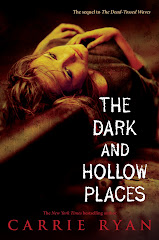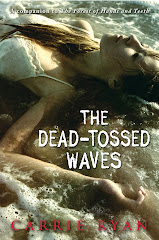Monday, March 24, 2008
Telling a Good Story
X-posted from my Tuesday Maven post on the Manuscript Mavens...
So... even though my book isn't out until Spring 2009 (April is the word on the street these days), I just got my first review! Click here to read Melissa Marr's thoughts on The Forest of Hands and Teeth. A huge thanks to Melissa for taking the time to read and comment on a debut book and thanks to my sister who read me the review over the phone because I was off in the mountains without internet access :)
Anyways, recently the Mavens all talked about those ah-ha moments in writing. As I said then, I get these moments all the time. I can have the same conversation about craft, read the same books on craft, have the same day dreams and each time I'll walk away with something new. The other day I had one of these ah-ha moments I wanted to share :)
I was reading a book and realized that while the writing for much of the book is great, some of the writing is just... writing. It's not great, it's not bad, it's not mundane or boring -- it's just words strung together getting points across. Honestly, I doubt anyone reading those particular passages would have thought anything of the way they were written -- like I said, they were written fine. They didn't stand out as gorgeous prose -- they didn't really stand out at all.
And suddenly I had this ah-ha moment! I realized that the purpose of writing a book is to tell a story (yeah, most of my ah-ha moments tend to also be duh! moments). I realized that sometimes we get so focused in on parts of our books that we forget to stand back and take in the big picture -- we forget to look at the story we're telling.
Sometimes I think it can be easy to focus on internal conflict versus external conflict versus raising the stakes versus showing all five senses that we forget that all of these devices serve to help us tell a compelling story. And I think sometimes you can look at individual scenes of a book and they work, but once put together as a cohesive whole suddenly the story feels off.
Here's a rather timely but odd example... it's March Madness, the season where everyone fills out NCAA brackets and joins office pools to see who wins. I love following the tournament but I never have the time to follow the whole season -- so when it comes to filling out my brackets I have NO idea who to pick. I do it all by gut and who sounds good and whose colors I like. JP was reviewing my choices and finally he said "each game you choose is totally plausible, when you look at your brackets on a game by game basis, it's solid. But overall there's no way you're going anywhere."
I've judged some contests recently where I see this happening -- scene by scene everything makes sense, but when you read the synopsis, when you look at those scenes adding up to become the whole, the story just isn't there -- it doesn't hold together.
So, along with all the myriad other things we remember when writing, don't forget that in the end we're all story tellers. How we tell that story (what devices we chose, the tone, the language, the POV) influences that story, but in the end, it's all about telling a good story.
So... even though my book isn't out until Spring 2009 (April is the word on the street these days), I just got my first review! Click here to read Melissa Marr's thoughts on The Forest of Hands and Teeth. A huge thanks to Melissa for taking the time to read and comment on a debut book and thanks to my sister who read me the review over the phone because I was off in the mountains without internet access :)
Anyways, recently the Mavens all talked about those ah-ha moments in writing. As I said then, I get these moments all the time. I can have the same conversation about craft, read the same books on craft, have the same day dreams and each time I'll walk away with something new. The other day I had one of these ah-ha moments I wanted to share :)
I was reading a book and realized that while the writing for much of the book is great, some of the writing is just... writing. It's not great, it's not bad, it's not mundane or boring -- it's just words strung together getting points across. Honestly, I doubt anyone reading those particular passages would have thought anything of the way they were written -- like I said, they were written fine. They didn't stand out as gorgeous prose -- they didn't really stand out at all.
And suddenly I had this ah-ha moment! I realized that the purpose of writing a book is to tell a story (yeah, most of my ah-ha moments tend to also be duh! moments). I realized that sometimes we get so focused in on parts of our books that we forget to stand back and take in the big picture -- we forget to look at the story we're telling.
Sometimes I think it can be easy to focus on internal conflict versus external conflict versus raising the stakes versus showing all five senses that we forget that all of these devices serve to help us tell a compelling story. And I think sometimes you can look at individual scenes of a book and they work, but once put together as a cohesive whole suddenly the story feels off.
Here's a rather timely but odd example... it's March Madness, the season where everyone fills out NCAA brackets and joins office pools to see who wins. I love following the tournament but I never have the time to follow the whole season -- so when it comes to filling out my brackets I have NO idea who to pick. I do it all by gut and who sounds good and whose colors I like. JP was reviewing my choices and finally he said "each game you choose is totally plausible, when you look at your brackets on a game by game basis, it's solid. But overall there's no way you're going anywhere."
I've judged some contests recently where I see this happening -- scene by scene everything makes sense, but when you read the synopsis, when you look at those scenes adding up to become the whole, the story just isn't there -- it doesn't hold together.
So, along with all the myriad other things we remember when writing, don't forget that in the end we're all story tellers. How we tell that story (what devices we chose, the tone, the language, the POV) influences that story, but in the end, it's all about telling a good story.
Subscribe to:
Post Comments (Atom)
















4 comments:
I love those ah-ha moments! I actually had one of those tonight while I was working on my novel. I've been banging my head against the wall trying to figure out how a major plot point was going to work and then magically...it all fell into place. I actually emailed my critique partner with the news. The subject title was "ah-ha!"
Just in case you didn't see it yet:
SNL link
Mac Tangent based on stuff I told you two weeks ago:
So, I got annoyed with something in my MacBook, and went and bought a memory upgrade from Kingston.
WAY WAY faster with more than 1GB of RAM. BUT--you can get a 4GB upgrade kit from Kingston for $110, and it's easy easy to install. So I would do that.
There was a good article in the Wall Street Journal back in February about this same sort of thing. About the pit of Importantitis and how writers can get so caught up in creating something great they never even manage to create something good.
Can't remember the exact name of the article but it was written by their drama critic Terry Teachout and 'Importantitis' was part of the title.
Post a Comment